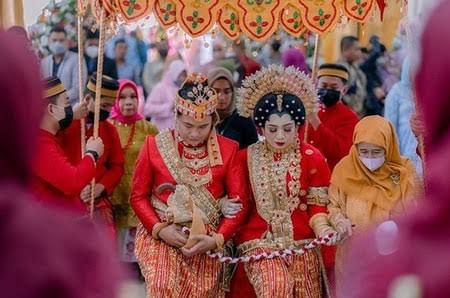KUPASONLINE.COM — The Bugis tribe is one of the many ethnic groups originating from the South Sulawesi region. Just like other cultures spread throughout Indonesia, the Bugis tribe also has customs or ritual aspects that are deeply rooted in the life of its people. This is done as a form of preserving regional culture so that it is timeless. The Bugis traditional wedding procession is a way for these Deutero Malay descendants to interpret how sacred the gate of life they are about to step on. Each stage of the Bugis traditional wedding series also holds prayers and deep meaning for the future bride and groom’s household. Reporting from various sources, these are the meaningful Bugis traditional wedding procedures.
Mammanu’manu’
This is the very first stage of the Bugis traditional wedding procession. Mammanu’manu’ is defined as an activity similar to the flight of a bird, bearing in mind that in this phase, the groom’s family will try to find the best match for their child by taking into account a number of criteria. If you have managed to find a suitable target, then the next step is to investigate the background of the intended girl to find out clearly whether the woman can be proposed to or not, this procession is called mappese-pese.
Mappese-pese
Basically, mappese-pese in a traditional Bugis wedding procession is an approach to find out more about the woman. If the prospective groom and his family have agreed with the woman of their choice, then the man’s family will ask for help from a close relative from the woman’s side to meet their family. Later, these relatives and the groom-to-be will visit the residence of the woman’s family by bringing souvenirs while expressing the intent and purpose of their arrival. If you succeed in getting the green light, then you can proceed with the next, far more sacred step, namely proposing marriage or massuro.
Massuro / Madduta
At the massuro or application stage, the male’s family will send someone who is most trusted as a mabbaja laleng or a trailblazer. The spokesperson appointed must have high skills in terms of negotiation, bearing in mind that the meeting between the two families will also discuss the size of the Uang Panai. Usually there is a process of ‘bargaining’ in very refined Bugis language. The amount of Uang Panai depends on the social status of the bride and groom, it can even be greater than the dowry. If the proposal has been well-received by the woman’s family, then the next step is to decide everything about the needs of the marriage or what is commonly known as mappettu ada.
Mappettu Ada
After the application procession is done, it’s time to determine the tanra esso (date of the wedding), sompa (dowry), and doi menre (shopping money). The wedding date will usually be determined by the bride’s family by considering the best times. Meanwhile, doi menre is spending money that will be given by the groom to the bride for the purposes of the cost of the wedding ceremony. Just like Uang Panai, the nominal amount of doi menre also depends on the social strata of the woman, her level of education, and the image of the bride’s family in the local community. Finally, the dowry for women of Bugis descent can be in the form of money or goods as a condition for a valid marriage. At the mappettu stage, there is also a delivery in the form of jewelery for the prospective bride.
Mappasau Botting
Mappasau botting is a grooming ritual that is performed privately by the prospective bride before her wedding day. This tradition generally takes up to three days in a row until the D-day arrives. Later, the bride and groom will be ‘cleaned’ using pandan leaf concoction which still emits hot steam. The goal is to remove all the sweat that is not good from the body of the bride and groom. Symbolically, pandan leaves are interpreted as a form of fragrance and harmony in the household. The event then continued with the use of black powder consisting of lime and tamarind. This is intended so that the skin of the prospective bride looks clean and radiant.
Mappanre Temme
In the Bugis language, mappanre means to feed, while temme means to finish. This mappanre temme tradition is directly related to people who have finished reciting the Koran or completing the Al-Qur’an. So, it can be concluded that mappanre temme is a habit of the Bugis people who always give appreciation to people who successfully complete the Qur’an by being fed. This tradition too
often carried out by the bride and groom right in the afternoon before the wedding day arrives with the recitation of the holy verses of the Koran directly from the bride and groom.
Mappacci
In the evening after the mappanre temme is over, there is a traditional Bugis wedding procession called mappacci. This ritual has the meaning that both the bride and groom need to be purified in body and soul from all the bad things that have been done. Mappacci begins with picking up the two bride and groom to be brought to the altar which is already filled with a row of ritual paraphernalia, starting from pillows, sarongs, jackfruit leaves, banana leaves, a plate of rice, candles, pacci leaves, and backs or metal containers. Then, every relative and guest present must rub pacci on the palms of the bride and groom. The invited guests who were summoned to join mapacci usually came from families with good social status.
Mappasili
Mappasili is a siraman procession performed in a Bugis traditional wedding. The purpose of this ritual is to cleanse the bride and groom while at the same time repelling unwanted misfortune. Mappasili spray water is taken directly from seven springs which also contain seven kinds of flowers. There is also a sprinkling of coins that are put into mappasili water. After the splashing procession, the water filled with coins will then be contested by unmarried guests. Some Bugis people believe that those who succeed in getting a coin will find it easier to find a mate.
Mappenre Boting and Madduppa Boting
Mappenre boting is the procession of delivering the groom to the bride’s house in a procession without the presence of parents. There is also a ritual to welcome the arrival of the groom (madduppa boting) which is performed by two teenage girls and boys, representatives of the parents of the bride, and a wenno spreader.
Mapasikarawa
After the marriage contract, the groom will be led to the bride’s private room to meet the wife he has proposed to. This tradition begins with the process of knocking on the door as a form of requesting permission to enter the room. It is this moment of meeting of the bride and groom that will later become the culmination of the mappasikarawa ritual. First of all, the bride and groom will make the first touch with legal status as husband and wife, the gentle touch starts from the shoulder area which symbolizes equality in household objects, then continues to the crown, chest or stomach area. After that, the bride and groom will wear sarongs that have been sewn so that their married life is always maintained. The event was continued with a sungkem procession to the parents or elders.
Mapparola
This is a reciprocal visit from the bride who visits the groom’s side of the residence. She visited her husband’s family while bringing a woven sarong as a wedding gift with her convoy
Ziarah and Massita Beseng
Pilgrimage to ancestral graves is generally carried out by the bridal couple one day after the end of the wedding ceremony. This is a form of respect for those who have passed away earlier. The series of traditional Bugis wedding processions was then closed with a beseng massita which was a meeting between the two families of the bride and groom to strengthen ties of friendship.(*)







